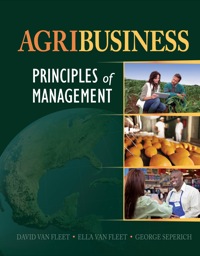Few companies excite such extreme emotions as Monsanto. To its critics, the agribusiness giant is a corporate
Question:
Few companies excite such extreme emotions as Monsanto. To its critics, the agribusiness giant is a corporate hybrid of Victor Frankenstein and Ebenezer Scrooge, using science to create foods that threaten the health of both people and the planet and intellectual property laws to squeeze every last penny out of the world’s poor. To its admirers, the innovations in seeds pioneered by Monsanto are the world’s best hope of tackling a looming global food crisis.” This lengthy quote from The Economist magazine nicely depicts the plight of the Monsanto Company of St. Louis.
The Monsanto Company was founded in 1901 by John F. Queeny, who had only a sixth-grade education, and his wife, Olga Monsanto. The company’s first product was saccharine, the artificial sweetener.
However, it was not until the end of World War II that the company got its “second wind” and recognized that the future of the chemical industry was in boosting crop production. The company grew and developed its experience in chemicals to develop pesticides. These chemicals, now called crop protection chemicals, changed the face and capacity of agriculture. These adjuncts provided a means to control the ravages of nature and increase global crop yields. As the company grew it began to acquire large seed genetic firms.
Early on Monsanto recognized that if the business of agriculture was to increase yields and minimize costs, it all begins with seed stock.
Before the 1970s two kinds of companies were evident: agricultural chemical companies and agricultural genetics companies. The chemical companies were Dupont Co. Inc., BASF SE, and others. Among the genetics companies were Dekalb Seed Company and Asgrow Seed Company. However, significant discoveries in biotechnology changed this comfortable duality.
The demarcation between chemistry and biology became blurred. It became possible to produce staple crops, like corn, that not only grew well and yielded a high amount of corn but had their own genetic resistance to a crop protection chemical. Because of Monsanto’s merger with Pharmacia and UpJohn, it had a competitive advantage in expertise. As a result it developed a strain of corn, Bt corn, which carried a resistance to the herbicide Roundup®, produced by Monsanto. This allowed a farmer to plant corn seed and as the crop and weeds that accompanied it grew the farmer could spray Roundup. The Roundup killed the weeds but did not harm the corn. By minimizing chemical applications, there was less strain on the natural ecology of the soil but greater yields of corn, which met the farmer’s agenda to maximize returns on investment.
This was a significant advancement for farming. It allowed the farmer to control weeds, gain a large corn harvest, and minimize herbicide costs. Since farmers do not set the price of their crops (this is done in open market commodity exchanges around the world), anything that reduces the cost of production is very attractive.
Questions
1. Boosting crop production to feed the hungry seems like a noble company mission. At what point does the cause become more important or less important than the argument that genetic modifications may lead to health and environmental problems?
2. Think about your own value system. Would you be eager or reluctant to work for Monsanto or its competitors?
3. Monsanto and its competitors legally own the seeds that they genetically modify as well as all future generations of seeds that are yielded by the original GM crops. Should this be the case, or should the growers own those succeeding generations of seeds?
Step by Step Answer:

Agribusiness Principles Of Management
ISBN: 9781285952352,9781285947839
1st Edition
Authors: David Van Fleet, Ella Van Fleet, George J. Seperich





